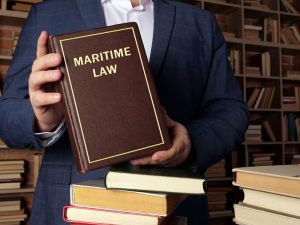How Maritime Law Protects Injured Maritime Workers
 An Introduction to Maritime Law
An Introduction to Maritime Law
If you’ve been involved in a maritime accident, you’re probably wondering what legal protections you’re entitled to. In maritime accident cases, we often meet clients who were not informed about their rights until after an injury occurred. Many maritime employees are never aware of their rights, even after suffering an injury.
Fortunately, maritime laws do exist to protect injured workers and offshore passengers like you. And they can help you get your life back on track.
If you’re a longshoreman, seaman, or other maritime worker who suffered an injury or loss because of someone else’s negligence, you could obtain compensation from those responsible. If you were a passenger on a vessel and were hurt in an offshore accident, you may also qualify to recover damages for your injuries.
Here’s what you should know about maritime law, as well as your rights after a maritime accident.
 Maritime Law FAQs
Maritime Law FAQs
What is Maritime Law?
Maritime law, also called admiralty law, is a judge-made law, rather than a statute like the Jones Act. Judge-made laws (also known as case laws) are created when a judge makes a new ruling and sets a precedent for future cases, essentially creating a new law.
General maritime law covers most legalities of the maritime industry, including providing legal protections to injured seamen involved in a workplace accident. You can think of this as the maritime version of workers compensation.
Does Maritime Law apply to me?
You are likely covered under Maritime/Admiralty Law if you:
-
Are an offshore worker who works as a seaman on a vessel of any kind (boats, oil rigs, dredges, pontoon rafts, etc.)
-
Have been involved in an offshore accident as a passenger (e.g. cruise ship injury)
-
Are a maritime employee who works near or adjacent to navigable waters, such as longshore and harbor workers (e.g. ship repairmen and maintenance workers)
What Types of Laws Apply After a Maritime Injury?
You have quite a few legal protections as an injured maritime worker. Let’s take a look at the different claims you can pursue under general maritime law.
Negligence Laws
A person is considered liable for all damages caused by their negligence. In other words, they are responsible for not doing what a “reasonable” person would have done under the same conditions. This is called the “reasonable person test” and it is used in most state-based claims.
Proving negligence under maritime law involves convincing a judge and/or jury that the defendant failed to take action that should have been taken, or by proving that the defendant did not apply proper safety measures. To recover damages in a maritime law case, you must prove this negligence. Under maritime law, there is also comparative negligence, which essentially means that both the employer and the injured worker could be proven negligent and partially responsible for the accident.
Learn more about negligence laws.
Unseaworthiness Laws
Under maritime law, employers are obligated to provide you with a ‘seaworthy’ vessel on which to work. This means the vessel owner needs to make sure all the vessel equipment is operating properly and is ‘reasonably fit for its intended use’.
A maritime injury claim based on unseaworthiness may mean that a maritime accident occurred because of:
-
Improper safety procedures (e.g. faulty safety gear or safety training)
-
Inadequate crew (e.g. understaffing or improper training of crew members)
-
Hazardous working conditions/maintenance (e.g. slippery decks or broken ladders)
-
Inadequate medical supplies and emergency preparedness (e.g. lacking first aid kits or improper medical training for crew members )
-
Unfit living conditions (e.g. mold from an unventilated cabin)
These are only a few examples of how unseaworthiness can cause serious injuries or illness. If you think you may have a maritime claim that relates to unsafe conditions, a maritime injury lawyer can help you get the proof you need.
Learn more about unseaworthiness.
Maintenance and Cure Laws
Maintenance and cure law requires that your employer provide you with certain benefits after a maritime injury at work.
Cure benefits

It is important to know that you are legally entitled to choose your own physician. Maritime employers often try to persuade injured maritime workers to see a company doctor, but your medical care is up to you. Remember that you only have to see the company doctor ONCE and NOT before seeing your own doctor.
Maintenance benefits
Maintenance benefits relate to your daily living expenses after suffering a maritime injury. Your employer must provide you a daily living stipend until you are released from your doctor’s care.
Maintenance is usually paid at a very low rate, but there is no legal standard for a low wage. If you’ve suffered a maritime injury, you are entitled to receive full compensation for your daily living expenses. This includes utility bills, food, and lodging. You should keep receipts and receipt copies over the course of your injury, so that your employer knows exactly how much they owe you. This is especially helpful if you find yourself requiring a maritime lawsuit. Another important note is to be careful about any “advances” you receive with your maintenance checks.
If your company refuses to provide you with maintenance and cure, then you’re allowed to file a maintenance and cure claim against your company. If this is the case, a maritime injury attorney can help you figure out what your options are.
Learn more about maintenance and cure laws.
Death on the High Seas Act (DOHSA)
The Death on the High Seas Act (DOHSA) is a federal statute that covers many cases when maritime workers die at sea.
If the death occurred more than three nautical miles from the shore of the United States due to negligence or unseaworthiness of the vessel, you may be able to file a claim under DOHSA. This law allows surviving family members to recover pecuniary damages, such as lost financial support and funeral expenses.
Wrongful death is an unfortunate reality of some serious maritime accidents, and a maritime injury lawyer can help you figure out how best to approach a relevant lawsuit. DOHSA is not your only option, and may not be the best fit for your family. The Jones Act and Longshore and Harbor Workers Act are often more helpful in cases of wrongful death in an offshore accident.
Learn more about family benefits after wrongful death in an offshore accident.
The Jones Act
The Jones Act, also known as the Merchant Marine Act, is a federal law statute that provides you with excellent rights if you were working as a seaman at the time of your maritime accident. In maritime injury cases, a Jones Act claim is often the best route because of the wide variety of financial compensation it offers.So how does a Jones Act claim work? Here are the basics:
-
You file a claim under the Jones Act against your employer. You must be able to prove negligence by either your employer or another crew member (since your company is legally responsible for their actions while at work).
-
Maritime workers who have suffered an injury on the job are able to be compensated for lost wages, all past and future medical expenses, pain and suffering, disability, and more.
-
The Jones Act applies to any seaman working on a vessel at the time of injury. This is a term with a broad definition, so speak to an experienced maritime lawyer if you aren’t sure about your seaman status.
-
The Jones Act also includes workplace caused illness. This is common with oil rig accident, as rig workers work with toxic chemicals. If you happen to get sick while aboard your vessel and must see a doctor in a foreign country, you can also pursue a Jones Act claim if that doctor did not treat you properly. Employers are required to find you timely and effective medical care, no matter where you are in the world.
Learn more about the Jones Act.
Longshore and Harbor Workers’ Compensation Act (LHWCA)
The Longshore and Harbor Workers’ Compensation Act is a federal law that provides compensation to injured longshoremen and other harbor workers who suffered an injury or lost a family member on the job.
Workers who are able to file this type of maritime injury claim include:
-
Longshore workers
-
Ship-repairers
-
Shipbuilders
-
Harbor construction workers
-
Workers who unload or load vessels
Typically, a Longshore and Harbor Workers Compensation Act claim will be filed by workers with injuries sustained on wharves, piers, dry docks, and terminals. Injuries sustained on a vessel would likely be filed under the Jones Act instead of the Longshore and Harbor Workers Compensation Act.
Benefits for longshore and harbor workers under this act most often include disability payments, medical expenses, and compensation for wrongful death. The U.S. Department of Labor goes into greater detail on how you should report an injury in order to qualify for LHWCA benefits.
Learn more about the Longshore and Harbor Workers’ Compensation Act.
The Saving to Suitors Clause
If you’re an injured maritime worker, you will likely use the above laws to obtain the financial compensation you deserve after a serious accident. However, you do have another option.
The Saving to Suitors Clause still falls under maritime law, but it does not require you to file a claim in a federal court. This clause allows injured maritime workers to pursue common law remedies in State court. Some benefits to taking your maritime injury case to State court include:
-
Easier access to a jury trial
-
Broader damages and remedies
-
More straightforward procedural rules
Some maritime injury claims that may do well in State court include slip and fall accidents or simple negligence cases. A maritime accident attorney can help you figure out if this is the best option for your case, or if you should stick to a Federal maritime injury claim.
Learn more about the Saving to Suitors Clause.
What Steps Should Maritime Workers Take When Considering a Maritime Injury Claim?
1. Report Your Maritime Injury Immediately.
Documentation is critical in maritime cases, so it’s important that an accident report is filled out right away. If you’ve sustained a maritime injury, delaying documentation will give your company an excuse to say that your injury is not as serious as it is.
2. Seek Medical Attention.
Your health always comes first. If you’re considering a claim, you have hopefully already spoken to a doctor. If you haven’t, the next best time is now. Choose a doctor you trust, or allow a law firm with knowledgeable maritime attorneys to find one for you. We know doctors who have experience with maritime cases, and who are aware of your rights under the Jones Act. This can help protect you from unethical employers and insurance companies.
3. Document All Medical Treatment and Medical Expenses.
Document everything; most importantly, in-depth descriptions of healthcare visits. You should also retain all paperwork (invoices, receipts, etc.) related to your medical costs. This includes travel expenses for medical care visits. Having this documentation helps to establish a timeline between injuries sustained and the time it took to recover. It also shows that you took your recovery seriously, which can help in your maritime injury case.
4. Get a Free Consultation from a Law Firm with Experienced Maritime Injury Lawyers.
Most personal injury lawyers work with state workers compensation laws, or personal injury claims involving car wrecks and other issues faced in state court. A law firm that focuses on many different disciplines is great for many things, but maritime injury cases should be handled by experts in the maritime industry.
Our maritime accident attorneys know the maritime industry. We have spent years helping injured maritime workers receive life-changing benefits through the laws outlined above. Our maritime attorneys know every trick that employers and insurance companies use to keep you from receiving compensation, and we also know how to fight them.
Contact a Maritime Law Attorney for Help

Remember that all of these maritime and admiralty laws can work together to protect your rights and livelihood after an injury. The more you understand how these laws affect you, the easier it will be for you to make smart decisions about your future.
Though our law firm is based in New Orleans, we offer services to maritime workers from all across the coast. If you’re in need of a Houston maritime injury attorney, we’re here to help. Mississippi? No problem.
Contact the experienced New Orleans maritime law attorneys at The Young Firm today for a free consultation. If you have questions about your maritime injury case, we have answers.
The Young Firm
400 Poydras St, Ste 2090
New Orleans, LA 70130
504-608-6308







